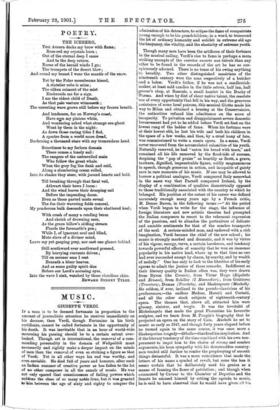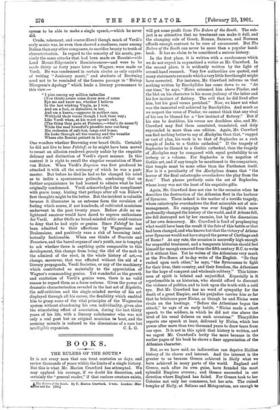MUSIC.
GITJSEPPE VERDI.
IF a man is to be deemed fortunate in proportion to the amount of journalistic attention he receives immediately on his decease, then Verdi, though Fortunino in his birth certificate, cannot be called fortunate in the opportunity of his death. It was inevitable that in an hour of world-wide mourning his passing should be to a certain extent over- looked. Though art is international, the removal of a com- manding personality in the domain of Weltpolitilc must necessarily and rightly make a deeper impact on the minds of men than the removal of even so striking a figure as that of Verdi. Yet in all other ways his end was worthy, and even enviable. He died full of years and honours, after such an Indian summer of creative power as has fallen to the lot of no other composer in all the annals of music. He was not only spared that consciousness of failing powers which saddens the close of so many noble lives, but it was granted to him between the age of sixty and eighty to conquer the admiration of his detractors, to eclipse the fame of compatriots young enough to be his grandchildren; in a word, to transcend the lot of ordinary humanity and exhibit in extreme old age the buoyancy, the vitality, and the elasticity of extreme yotith.
Though many men have been the artificers of their fortunes in the musical calling, Verdi's rise to fame is perhaps a more striking example of the carriere ourerte aux talents than any other to be found in the records of the art he has so con- , spicuously adorned. There is no trace of his owing anything : to heredity. Two other distinguished musicians of the nineteenth century were the sons respectively of a butcher and a baker. Verdi's father, if he was not a candlestick- maker, at least sold candles in the little osteria, half inn, half • grocer's shop, at Roncole, a small hamlet in the Duchy of Farina. And when by dint of sheer native talent, the resolute use of every opportunity that fell in his way, and the generous assistance of some local patrons, this musical Giotto made his way to Milan and obtained a hearing at the Conservatoire, the authorities refused him admittance on the score of incapacity. To privation and disappointment severe domestic bereavement had yet to be added before Verdi set foot on the ,lowest rung of the ladder of fame. When his fortunes were at their lowest ebb, he lost his wife and both his children in the space of a few weeks, and then, by a cruel irony of fate, was commissioned to write a comic opera. In a sense, Verdi never recovered from the accumulated calamities of his youth. Naturally reserved, he had "eaten his bread with tears," and. remained all his life unmoved by the flood-tide of success, despising the "pap of praise" as heartily as Scott, a grave, taciturn, dignified, impenetrable figure, coldly magnanimous in speech, though generous in action, and incapable of gaiety save in rare moments of his music. If one may be allowed to borrow a political analogue, Verdi conquered Italy somewhat ' in the same way that Parnell conquered Ireland, by the :display of a combination of qualities diametrically opposed to those traditionally associated with the country to which he belonged. His position at the outset of his career was defined accurately enough many years ago by a French critic, M. Denne Baron, in the following terms :—" At the period when Verdi began to write for the stage, the influence of foreign literature and new artistic theories had prompted the Italian composers to resort to the vehement expression of the passions, and to abandon the portraiture of delicate and amiable sentiments for that of the sombre transports of the soul. A serious-minded man, and endowed with a rich imagination, Verdi became the chief of the new school ; his music is strongly marked and dramatic, and it was by virtue of his vigour, energy, verve, a certain harshness, and tendency towards powerful effects of sonority that he won an immense popularity in his native land, where up to that time no one had ever succeeded except by charm, by suavity, and by wealth of melody." One has only to look to the librettos of his early operas to admit the justice of these remarks. Indifferent as their literary quality in Italian often was, they were drawn from Byron (the Corsair), from Victor Hugo (Rigoletto and Erman), from Schiller (I Masnadieri), from Guttierez (Troratore), Dumas (Traviata), and Shakespeare (Macbeth) . He seldom, if ever, inclined to the pseudo-classicism of his predecessors,—the endless Medeas, Horatii and Curiatii, and all the other stock subjects of eighteenth-century opera. The themes that, above all, attracted him were gloomy, sinister, and tragic. It was the terribiltd of Michelangelo that made the great Florentine his favourite sculptor, and we learn from M. Pougin's biography that he projected an opera on the story of Cain. Macbeth he set to music as early as 1847, and though forty years elapsed before he turned again to the same source, it was once more a Shakesperian tragedy—Othello—that fired his inspiration. And if the literary tendency of the time combined with his own tem- perament to impel him to the choice of strong and sombre arguments, his keen sympathy with his downtrodden country- men tended still further to render the prophesying of smooth things distasteful. It was a mere coincidence that made the letters of his name a symbol of revolt, but none the less it seems certain that he deliberately used his genius as a means of fanning the flame of patriotism ; and though when summoned by Cavour to the Chamber of Deputies and the Senate he amused himself by setting the agenda to music, he is said to have observed that he would have given all Hs
operas to be able to make a single speech,—which he never did.
Crude, vehement, and coarse-fibred though much of Verdi's early music was, he even then showed a readiness, rarer among Italian than any other composers, to sacrifice beauty to truth of characterisation. In regard to the sonority of his music, pre- cisely the same attacks that had been made on Rossini—ride Lord Mount-Edgcumbe's Reminiscences—and were to be made thirty or forty years later on Wagner, were made on Verdi. He was condemned in certain circles as only capable of writing " Janissary music," and students of Browning need not to be reminded of the famous passage in "Bishop Blougram's Apology" which lends a literary permanence to this view :— " I pine among my million imbeciles
(You think) aware some dozen men of sense Eye me and know me, whether I believe
In the last winking Virgin, as I vow, And am a fool, or disbelieve in her, And am a knave,—approve in neither case,
Withhold their voices though I look their way ;
Like Verdi when, at his worst opera's end, (The thing they gave at Florence,—what's its name ?) While the mad housefurs plaudits near out-bang His orchestra of salt-box, tongs and bones, He looks through all the roaring and the wreaths
Where sits Rossini patient in his stall."
One wonders whether Browning ever heard Mello. Certainly he did not live to hear Falstaff, or he might have been moved to recast an allusion rendered grossly unfair by the exquisite delicacy and distinction of Verdi's ripest manner. In this context it is right to recall the singular recantation of Hans von Billow. When Verdi's Requiem was first produced he attacked it with all the acrimony of which he was a past- master. But before he died he had so far changed his mind as to indite a spontaneous palinode, confessing that on further acquaintance he had learned to admire what he had originally condemned. Verdi acknowledged the compliment with grave irony, hinting that perhaps after all von Billow's first thoughts might be the better. But the incident is valuable because it illustrates in an extreme form the revulsion of feeling which scores, if not hundreds, of cultivated musicians underwent in the past twenty years. Before .zlicla no en- lightened amateur would have dared to express enthusiasm for Verdi. After Otello no broad-minded critic could venture to deny that he had style or genius. Since Falstaff he has been admitted to their affections by Wagnerians and Brahmsians, and positively runs a risk of becoming intel- lectually fashionable. When one thinks of Trariata and Trovatore, and the barrel-organs of one's youth, one is tempted to ask whether there is anything quite comparable to this development, this change from being the idol of the mob to the admired of the elect, in the whole history of art,—a change, moreover, that was effected without the aid of a literary propaganda, Verdi Societies, or any of the machinery which contributed so materially to the appreciation of Wagner's commanding genius. Yet wonderful as the growth and exaltation of Verdi's genius were, there is no valid reason to regard them as a bums naturae. Given the power of dramatic characterisation revealed in the last act of Rigoletto, the self-criticism and the single-minded service of his art displayed through all his career, the flexibility which enabled him to grasp some of the vital principles of the Wagnerian system without abandoning his own individuality, given also the stimulating effect of association, during the last thirty years of his life, with a literary collaborator who was not only a real poet but an original musician to boot, and the seeming miracle is reduced to the dimensions of a rare but







































 Previous page
Previous page